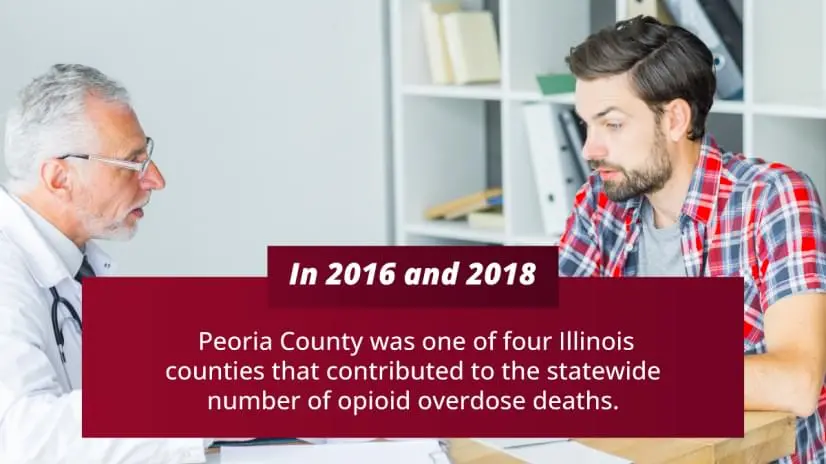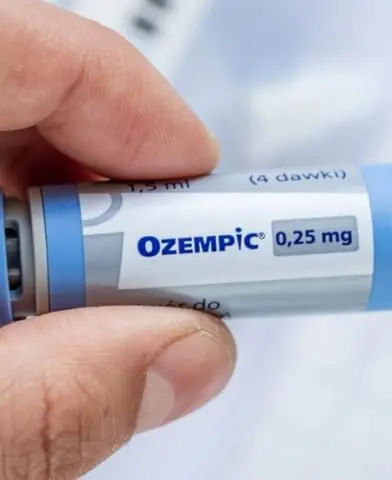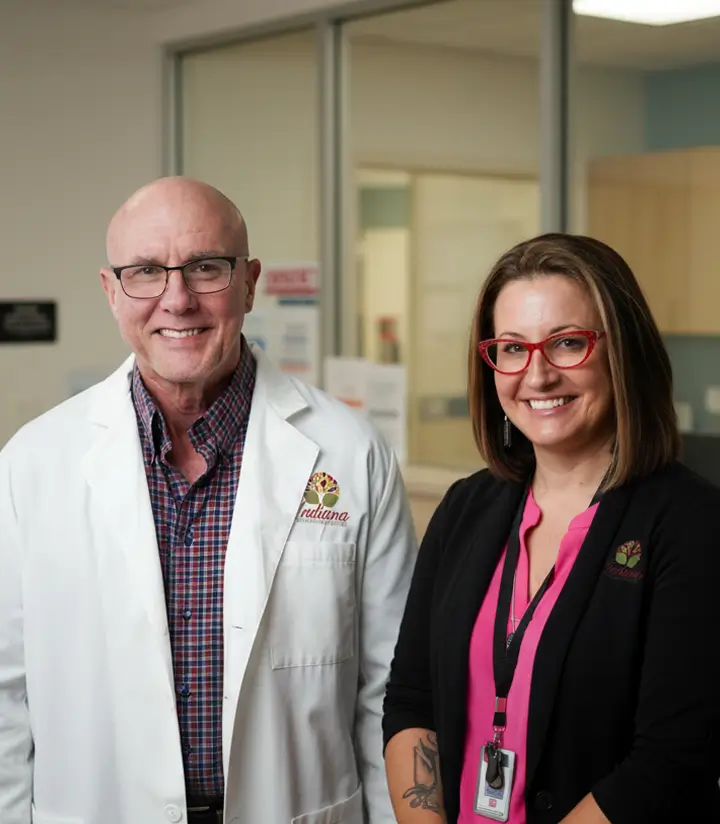
Substance Abuse Treatment Near Peoria, Illinois
Clinically Reviewed by:
The goal of substance abuse treatment centers is to provide a supportive and structured atmosphere where individuals can receive the required tools and support to achieve sobriety and maintain long-term recovery. Seeking help from professional support can be the first step towards a healthier life. Keep reading to learn more about how to find treatment centers near Peoria, Illinois.

Key Takeaways
Substance abuse treatment helps people facing drug and alcohol addiction in Peoria, Illinois. Here’s what you need to know:
- Substance abuse, including drugs and alcohol, poses risks to health and well-being.
- Individuals grappling with addiction have access to various types of treatment centers tailored to their needs.
- Choosing a suitable treatment facility can offer hope and provide clients the chance for a successful recovery journey.
Indiana Center for Recovery provides personalized treatment programs to support individuals with addiction on their journey to lasting sobriety. Call us at (844) 650-0064 to explore our services.
Importance of Addiction Treatment Centers
Through various programs and therapies, addiction treatment centers help people crush their dependence on drugs or alcohol and regain control of their lives.
Treatment centers provide a safe atmosphere where individuals can receive medical attention, counseling, and behavioral therapy tailored to their needs. By managing the root causes and teaching coping skills, these centers empower individuals to be free from the cycle of substance abuse.
Seeking help from an addiction treatment center is a positive step towards recovery, as it provides the tools and support for long-term sobriety. People and their loved ones need to recognize the value of these centers in helping individuals overcome addiction and live healthier, fulfilling lives.
Addiction in Peoria, Illinois
In Peoria, Illinois, addiction is a significant concern affecting individuals and families. Substance abuse, including drugs and alcohol, poses risks to health and well-being.
Addiction can lead to various problems like legal issues, strained relationships, and health complications. Treatment centers offer support through counseling, therapy, and rehabilitation programs.
They provide a structured environment for individuals to address their addiction and learn coping skills for recovery. The community needs to recognize the impact of addiction and support those seeking help to overcome it.
Types of Addiction Treatment Centers Serving Peoria, Illinois
In Peoria, Illinois, individuals grappling with addiction have access to various types of treatment centers tailored to their needs. From residential facilities providing immersive care to outpatient centers offering flexibility, these centers offer comprehensive support for those seeking recovery.
Residential Treatment Centers
Residential treatment centers provide round-the-clock care for individuals struggling with addiction. Here, patients reside onsite for a specified duration, typically weeks to several months.
These centers offer intensive therapy, counseling, and support in a structured environment. Patients acquire personalized treatment plans tailored to their needs, addressing underlying issues contributing to addiction.
Residential centers foster a supportive community where individuals can focus solely on their healing without distractions from the outside world. This immersive approach helps patients develop essential coping skills and strategies for long-term sobriety.
Outpatient Treatment Centers
Outpatient treatment centers offer flexible programs for individuals seeking help for addiction while maintaining their daily routines. Unlike residential centers, patients do not reside onsite but attend scheduled therapy sessions and treatments while living at home.
Outpatient programs vary in intensity, ranging from several hours a week to daily sessions, depending on the individual’s needs. These centers provide counseling, therapy, medication management, and support groups to assist individuals in overcoming addiction. Outpatient treatment allows patients to receive care while fulfilling work, school, or family responsibilities.
Detox Centers
Detox centers specialize in helping individuals withdraw from drugs or alcohol safely. Detoxification, the initial phase of addiction treatment, involves eliminating toxins from the body while managing withdrawal symptoms. These centers offer medical supervision and support to ensure a safe detox process.
Medical professionals may administer medications to alleviate withdrawal symptoms and monitor vital signs. Detox centers focus on stabilizing patients physically and mentally before transitioning them to further treatment, such as residential or outpatient programs. Detox is a crucial step in the recovery journey, laying the foundation for ongoing addiction treatment.
What to Expect in Addiction Treatment
Addiction treatment centers offer comprehensive care to support individuals. When entering these centers, individuals can expect a welcoming and supportive environment where their needs are prioritized.
Initially, patients undergo assessments to determine the most suitable treatment plan. It may include medical evaluations, psychological assessments, and discussions about personal goals.
Treatment typically involves a combination of therapies, such as individual counseling, group therapy, and behavioral interventions, tailored to address the root causes of addiction. Patients receive education about addiction, coping strategies, and life skills to help them maintain sobriety outside of treatment.
Additionally, centers offer aftercare programs to support individuals as they transition back into their daily lives. Overall, individuals can expect compassionate care, evidence-based treatments, and ongoing support throughout their recovery journey in Peoria’s addiction treatment centers.
Addiction Treatment at Indiana Center for Recovery
A range of addiction treatments are available to support individuals on their journey to recovery. From traditional therapies to alternative approaches, Indiana Center for Recovery offers comprehensive options tailored to individual needs and preferences.
Behavioral Therapy
Behavioral therapy is a fundamental approach used in addiction treatment. It focuses on identifying and modifying unhealthy behaviors associated with addiction. Therapists help individuals understand the triggers and patterns of their addictive behavior and teach coping skills to manage cravings and avoid relapse.
Cognitive behavioral therapy (CBT) and dialectical behavior therapy (DBT) are common forms of behavioral therapy used in addiction treatment. These therapies empower individuals to develop healthier thought patterns and coping mechanisms, promoting long-term recovery.
Medication-Assisted Treatment
Medication-assisted treatment (MAT) is available to aid individuals in overcoming addiction to opioids, alcohol, and other substances. MAT combines medication, such as methadone, buprenorphine, or naltrexone, with counseling and behavioral therapies to address addiction effectively.
These medications help alleviate withdrawal symptoms, reduce cravings, and block the effects of opioids or alcohol. MAT is tailored to each individual’s needs and may be used as part of a comprehensive treatment plan to support long-term recovery from addiction.
Dual Diagnosis Treatment
Dual-diagnosis treatment addresses co-occurring mental health disorders alongside addiction. Many individuals struggling with addiction also experience conditions like depression, anxiety, or bipolar disorder.
Dual diagnosis treatment integrates therapy and medication management to address both substance abuse and mental health issues simultaneously. By treating both conditions concurrently, individuals can achieve better outcomes in their recovery journey and improve overall well-being.
Alternative Therapies: Art, Music, and Equine Therapy
Addiction treatment centers offer alternative therapies such as art, music, and equine therapy to complement traditional approaches. These therapies provide creative outlets for individuals to express themselves, process emotions, and learn new coping skills.
Art therapy involves creating artwork to explore feelings and experiences related to addiction. Music therapy uses music to promote relaxation, self-expression, and emotional healing.
Equine therapy involves interacting with horses to develop trust, communication, and emotional regulation. These alternative therapies offer unique benefits and can enhance the overall treatment experience for individuals in recovery from addiction.
Paying For Treatment
Indiana Center for Recovery accepts various types of insurance to help individuals access the necessary care. Insurance coverage for addiction treatment can vary depending on the provider and policy. Individuals must review their insurance plan to understand what services are covered and any out-of-pocket expenses they may incur.
The Right Addiction Treatment Center
When seeking the right addiction treatment center, it’s vital to consider various factors. Look for drug rehab centers that offer a range of treatment options, including individual therapy and intensive outpatient programs. Consider facilities with private rooms for added comfort and privacy.
Seek centers that provide residential treatment and mental health services to address unique needs comprehensively. Additionally, inquire about the facility’s case management team, which can offer guidance and support throughout recovery. Choosing a suitable treatment facility can offer hope and provide clients the chance for a successful recovery journey.
Frequently Asked Questions (FAQ)
What is the most common therapy for substance abuse?
The most common therapy for substance abuse is cognitive-behavioral therapy (CBT). CBT focuses on changing unhealthy thoughts and behaviors related to substance use. It helps individuals identify triggers for their substance use and develop coping strategies to manage cravings and avoid relapse.
Through CBT, individuals learn to challenge negative thought patterns and create healthier ways of thinking and behaving. This therapy is widely used in addiction treatment programs across the United States because of its effectiveness in addressing both the psychological and behavioral aspects of substance abuse. CBT empowers individuals to take control of their recovery journey and build a foundation for long-term sobriety.
What are three options for drug abuse treatment?
Three options for drug abuse treatment include residential treatment programs, outpatient treatment programs, and medication-assisted treatment (MAT). Residential treatment programs provide intensive care in a live-in facility, offering therapy and support 24/7.
Outpatient treatment programs allow individuals to attend therapy sessions while living at home, feeding flexibility for those with work or family commitments. Medication-assisted treatment involves the use of medicines, such as methadone or buprenorphine, along with counseling and support services to help manage cravings and withdrawal symptoms.
Recovery Support for Peoria Families
Peoria families face the harsh reality of opioid addiction and heavy drinking throughout the Illinois River valley communities. Indiana Center for Recovery offers effective treatment close enough for family involvement while giving you space to heal.
Start with our medical detox program providing 24/7 nursing care and comfort measures to safely clear substances before beginning deeper work.
Build lasting recovery through our addiction treatment program combining counseling, group support, and medication management, vital for Peoria County, which ranked among Illinois’ highest for opioid deaths in 2016 and 2018. When you need structure, our inpatient drug & alcohol treatment offers constant support, while dual diagnosis services address mood, trauma, and anxiety issues that often accompany addiction.
Call (844) 650-0064 to discuss admission, insurance, and next steps. Visit our Terre Haute rehab center, the closest ICFR location to Peoria, to connect with specialists ready to guide your recovery.






 100% Confidential
100% Confidential
